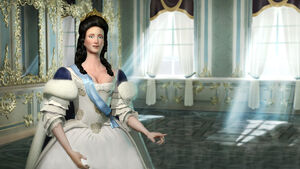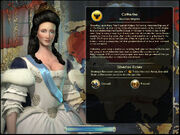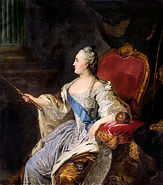Catherine II or Catherine the Great (2 May 1729 – 17 November 1796) was the empress of Russia after she organized a coup to overthrow her husband. She leads the Russians in Civilization V.
In-Game[]

Catherine II in game
Catherine speaks modern Russian. On her diplomacy screen, she is in her palace, which is likely the famous Winter Palace in Saint Petersburg.
Unique Ability: Siberian Riches
Voice Actress: Svetlana Migdissova
AI Traits[]
| Trait | Amount |
|---|---|
| Competitiveness | 6 (8-4) |
| Wonder Competitiveness | 7 (9-5) |
| City-State Influence Competitiveness | 7 (9-5) |
| Boldness | 3 (5-1) |
| Diplobalance | 6 (8-4) |
| Hate Warmongers | 5 (7-3) |
| Willingness to Denounce | 6 (8-4) |
| Willingness to Declare Friendship | 6 (8-4) |
| Loyalty | 6 (8-4) |
| Neediness | 6 (8-4) |
| Forgiveness | 4 (6-2) |
| Chattiness | 7 (9-5) |
| Meanness | 4 (6-2) |
| Offensive Unit Production | 6 (8-4) |
| Defensive Unit Production | 6 (8-4) |
| Defensive Building Production | 6 (8-4) |
| Military Training Buildings Production | 5 (7-3) |
| Recon Unit Production | 5 (7-3) |
| Ranged Unit Production | 5 (7-3) |
| Mobile Unit Production | 6 (8-4) |
| Naval Unit Production | 3 (5-1) |
| Naval Recon Unit Production | 3 (5-1) |
| Air Unit Production | 3 (5-1) |
| Naval Growth | 3 (5-1) |
| Naval Tile Improvements | 3 (5-1) |
| Water Connections | 3 (5-1) |
| Expansion | 8 (10-6) |
| Growth | 3 (5-1) |
| Tile Improvements | 5 (7-3) |
| Infrastructure (Roads) | 5 (7-3) |
| Production Emphasis | 6 (8-4) |
| Gold Emphasis | 5 (7-3) |
| Science Emphasis | 8 (10-6) |
| Culture Emphasis | 6 (8-4) |
| Happiness Emphasis | 3 (5-1) |
| Great People Emphasis | 6 (8-4) |
| Wonder Emphasis | 5 (7-3) |
| Religion Emphasis | 6 (8-4) |
| Diplomacy Victory | 5 (7-3) |
| Spaceship Victory | 9 (10-7) |
| Nuke Production | 8 (10-6) |
| Use of Nukes | 8 (10-6) |
| Use of Espionage | 8 (10-6) |
| Anti-Air Production | 5 (7-3) |
| Air Carrier Production | 5 (7-3) |
| Land Trade Route Emphasis | 5 (7-3) |
| Sea Trade Route Emphasis | 5 (7-3) |
| Archaeology Emphasis | 5 (7-3) |
| Trade Origin Emphasis | 5 (7-3) |
| Trade Destination Emphasis | 5 (7-3) |
| Airlift Emphasis | 5 (7-3) |
| Likeliness to Declare War | 4 (6-2) |
| Likeliness to be Hostile | 6 (8-4) |
| Likeliness to be Deceptive | 7 (9-5) |
| Likeliness to be Guarded | 5 (7-3) |
| Likeliness to be Afraid | 5 (7-3) |
| Likeliness to be Friendly | 7 (9-5) |
| Likeliness to be Neutral | 5 (7-3) |
| Ignore City-States | 4 (6-2) |
| Friendliness to City-States | 6 (8-4) |
| Protection of City-States | 6 (8-4) |
| Conquest of City-States | 7 (9-5) |
| Bullying of City-States | 5 (7-3) |
Personality and Behavior[]
As a general warning, do not attack Catherine unless you are sure that you'll win. She is one of the hardest leaders to make peace with, and if you are losing, or nobody is winning, Catherine will often accept peace only if you give her all your resources and cities that you can trade, or at least a large amount of ![]() Gold.
Gold.
Catherine will almost always go for a scientific victory.
Catherine prefers to expand her empire fast, and puts a high emphasis on ![]() Science.
Science.
Catherine likes to raise a rather large army with several mounted units, which will later be replaced by armored units. She is also very likely to use nuclear weapons and espionage.
Catherine normally tries to conquer city-states, but will sometimes befriend and protect them.
Catherine is one of the easiest leaders to befriend and is hardly a warmonger. Watch out for her deceptiveness, however, as she has a strong tendency to backstab you through denunciations or wars.
Civilopedia entry[]
History[]
Catherine the Great ruled Russia during the latter half of the 18th century. She oversaw a great expansion of the Russian empire, adding tens of thousands of square miles of territory through conquest and shrewd diplomacy. A beautiful and intelligent woman, she beguiled and seduced the best minds of Europe, making her court one of the centers of Enlightenment thinking on the Continent. Although born in Germany, Catherine is one of the greatest rulers in Russian history.
Early Life[]
Sophie Friederike Auguste Von Anhalt-Zerbst was born in Stettin in 1729, a princess of Pomerania, a small kingdom in Prussia. At 16 she was married to Grand Duke Carl Peter Ulrich, the heir to the Russian throne, becoming Grand Duchess Catherine Alekseyevna. Catherine quickly learned Russian and joined the Russian Orthodox Church. Largely self-educated, Catherine immersed herself in the literature of the time. Endowed with both beauty and intelligence, she became strong friends (if not more) with the great thinkers of the day, including the brilliant French philosophers Rousseau and Diderot.
Rise to Power[]
Catherine's marriage was extremely unhappy. Her husband, the Tsar Peter III, was by all accounts a shabby and neurotic person. He was described as mean, cruel, hideous (from smallpox scars) and a drunkard. He was said to detest Russians and loved Prussians, which didn't endear him to the Russian court. Although born a foreigner, Catherine was far more popular with the nobility and, most importantly, with the Russian military.
At the age of 33, with the support of the Imperial guard, she overthrew her husband, who was soon killed "in a hunting accident," leaving Catherine the sole ruler of Russia.
Foreign Policy[]
As Empress, Catherine pursued an expansionist policy backed by military muscle. The "First Russo-Turkish War" (1768-1774) − declared by Sultan Mustafa III after a border incident in which a Cossack entered Ottoman territory and allegedly slaughtered the residents of Balta − was a resounding Russian success, gaining for Catherine the Southern Ukraine, Northern Caucasus and the Crimea, expanding Russian access to the Black Sea. The Ottomans tried to take their territory back in the Second Russo-Turkish war, but they failed miserably.
In the years following the French Revolution, Catherine became afraid that Enlightenment movements throughout Europe would threaten the monarchies of Europe. Toward the end of the century Poland, a Russian puppet, began to show disturbing signs of edging toward democracy. In 1792 Russian forces defeated Polish loyalists in the Polish "War in Defense of the Constitution," following which Poland was partitioned between Russia, Austria and Prussia.
Throughout her reign Catherine maintained cordial relations with the great powers of Europe, Prussia, France and Austria, who in return did not stand in the way of Russian expansion.
Domestic Policy[]
During her reign Catherine undertook a wide range of political reforms, attempting to shape up the notoriously corrupt and incompetent Russian bureaucracy. She tried to model her government and court on Versailles, France. She paid for her reforms by seizing property from the clergy, who owned almost one-third of the land and serfs in Russia. She curried favor with the aristocracy, expanding their already-great power over the Russian peasants.
In 1773 a plague broke out in Russia, which was already suffering from ill-effects of the long war with Turkey. Taking advantage of growing public disaffection, Pugachov, a Cossack officer, pretended to be Catherine's dead husband, Tsar Peter III, and attempted to raise a peasant army to overthrow the Empress while the Russian military was locked in battle with the Turks. Fortunately for Catherine, the First Russo-Turkish War ended at just the right time, and a Russian army was able to return from the Front and crush the rebellion before it could reach Moscow. This made Catherine suspicious of the Russian peasants and she implemented even more repressive laws against them.
The Arts[]
A patron of the arts, Catherine commissioned many statues and paintings. Under her rule St. Petersburg was transformed from a primitive and forbidding city into one of the most beautiful and impressive European capitals. Her private art collection formed the basis of the famous Hermitage Museum, one of the world's great art museums.
The Scandal[]
Despite her many public successes, Catherine is best known for her private excesses. Her affairs are legendary; it has been suggested that she slept with a fairly large fraction of the Russian officers corps, not to mention her many well-publicized dalliances with a horde of well-known European politicians and artists. It is said that once she tired of a lover Catherine would "pension him off," giving him a large gift of cash, peasants, and land somewhere far away from Moscow.
Judgment of History[]
Catherine's reign was notable for imperial expansion. Most important were the securing of the northern shore of the Black Sea, the annexation of the Crimea, and the expansion into the steppes beyond the Urals. This permitted the protection of Russian agricultural settlements in the south and the establishment of trade routes through the Black Sea. Catherine's partitioning of Poland also helped bring Russia closer to the rest of Europe, at least geographically.
Catherine implemented many public work projects throughout Russia and its possessions. She also increased internal and foreign trade. On the other hand, she did little to improve the lot of the Russian peasant; in fact, their lives grew distinctly harder during her reign.
Catherine died at the age of 67, having lived longer than any other Romanov monarch. Like Queen Elizabeth I of England, she proved that a woman could be smart enough and tough enough to lead a great country.
Lines[]
| Codename | Quote (English translation) | Quote (Russian) | Notes |
|---|---|---|---|
| Attacked | You have mistaken my passion for weakness, you will regret this. | Ты принял мою страсть за слабость, ты пожалеешь об этом. / Ty prinyal moyu strast' za slabost', ty pozhaleyesh' ob etom. | |
| Declares War | You have been behaving very badly, you know it. Now it's payback time. | Ты очень плохо себя вёл, ты это знаешь. Настал час расплаты. / Ty ochen' plokho sebya vol, ty eto znayesh'. Nastal chas rasplaty. | |
| Defeated | We were defeated, so this makes me your prisoner. I suppose there are worse fates. | Мы были побеждены, так что я становлюсь твоей пленницей. Мне кажется, это не самый худший удел. / My byli pobezhdeny, tak chto ya stanovlyus' tvoyey plennitsey. Mne kazhetsya, eto ne samyy hudshiy udel. | |
| Hate Hello | What do you need?! | Что тебе нужно?! / Chto tebe nuzhno?! | |
| Hate Let's Hear It 01 | And? | И? / I? | |
| Hate Let's Hear It 02 | Next. | Дальше. / Dal'she. | |
| Hate Let's Hear It 03 | <unpleasant tone> Go on. | Продолжай. / Prodolzhay. | |
| Hate No 01 | Are you joking?! | Ты шутишь?! / Ty shutish'?! | |
| Hate No 02 | I beg your pardon?! | Прошу прощения?! / Proshu proshcheniya?! | |
| Hate No 03 | This is unacceptable. | Это неприемлемо. / Eto nepriyemlemo. | |
| Hate Yes 01 | Oh... Very good. | Ох... Очень хорошо. / Oh... Ochen' horosho. | |
| Hate Yes 02 | I think...I shall agree. | Пожалуй, я...соглашусь. / Pozhaluy, ya...soglashus'. | |
| Hate Yes 03 | <neat tone> Deal. | Договорились. / Dogovorilis'. | |
| Intro | I greet you, stranger! If you are as intelligent and tactful as you are attractive, we'll get along just fine. | Приветствую тебя, незнакомец! Если твой ум и такт сравнимы с твоей привлекательностью - мы замечательно поладим. / Privetstvuyu tebya, neznakomets! Yesli tvoy um i takt sravnimy s tvoyey privlekatel'nost'yu - my zamechatel'no poladim. | |
| Neutral Hello | Hello! | Здравствуй! / Zdravstvuy! | |
| Neutral Let's Hear It 01 | <polite tone> Go on. | Продолжай. / Prodolzhay. | |
| Neutral Let's Hear It 02 | Speak. | Говори. / Govori. | |
| Neutral Let's Hear It 03 | Go on. | Продолжай. / Prodolzhay. | This is the same line as NeutralLetsHearIt01. |
| Neutral No 01 | Ha! Of course not! | Ха! Разумеется, нет! / Ha! Razumeyetsya, net! | |
| Neutral No 02 | We decline. | Мы отказываемся. / My otkazyvayemsya. | |
| Neutral No 03 | Certainly not. | Конечно, нет. / Konechno, net. | |
| Neutral Yes 01 | <polite tone> Deal. | Договорились. / Dogovorilis'. | |
| Neutral Yes 02 | Wonderful. | Прекрасно. / Prekrasno. | |
| Neutral Yes 03 | Very good. | Очень хорошо. / Ochen' horosho. | |
| Peaceful | Now it's the time to enjoy the fruits of peace. | Теперь пора насладиться плодами мира. / Teper' pora nasladit'sya plodami mira. | |
| Request | How would you like it if I propose this kind of exchange? | Как тебе понравится, если я предложу такой обмен? / Kak tebe ponravitsya, yesli ya predlozhu takoy obmen? |
Intro[]

Greetings upon thee, Your Imperial Majesty Catherine, wondrous Empress of all the Russias. At your command lies the largest country in the world. Mighty Russia stretches from the Pacific Ocean in the east to the Baltic Sea in the west. Despite wars, droughts, and every manner of disaster the heroic Russian people survive and prosper, their artists and scientists among the best in the world. The Empire today remains one of the strongest ever seen in human history - a true superpower, with the greatest destructive force ever devised at her command.
Catherine, your people look to you to bring forth glorious days for Russia and her people, to revitalize the land and recapture the wonder of the Enlightenment. Will you lead your people once more into greatness? Can you build a civilization that will stand the test of time?
Gallery[]
See also[]
- Catherine (Civ5)/Conquest of the New World
- Catherine in other games
| Civilization V Leaders [edit] |
|---|
| Ahmad al-Mansur |
| 1 Requires a DLC
|


